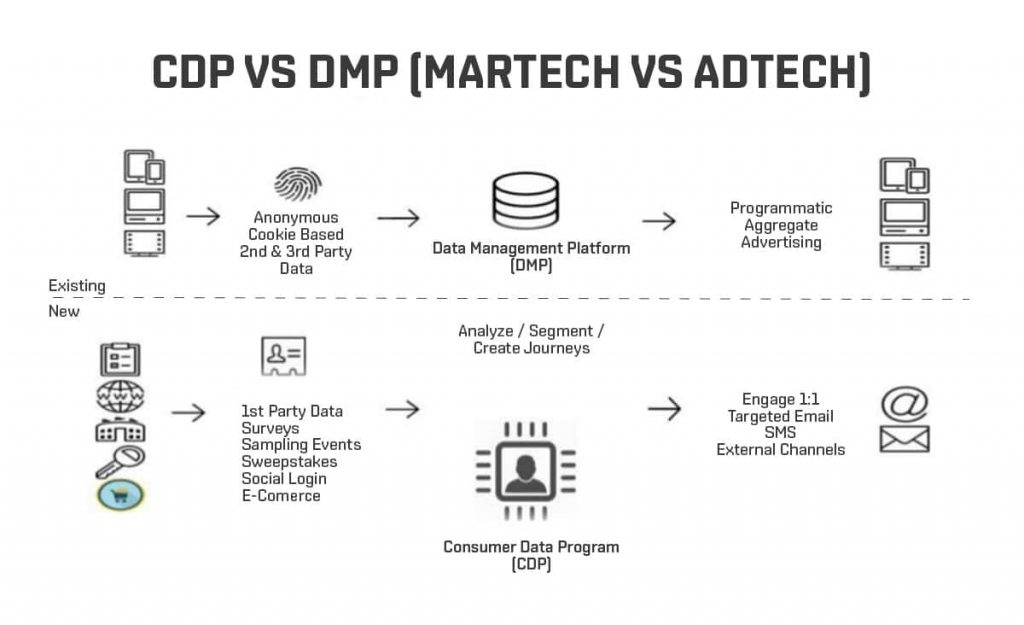As the village shopkeeper of a bygone era, Tarmo knew you and your family, your hobbies and your purchase history. Most of the time, he could anticipate what products to offer you and when. Knowing your “analogue footprint” allowed Tarmo to operate with subtlety and provide you with a genuine service instead of trying to push things on you.
The best of today’s digital village shopkeepers can offer a similar service experience with the help of those three acronyms mentioned earlier: DMP, CDP and GDPR. DMP means Data Management Platform. CDP stands for Customer Data Platform. The more recently created acronym, GDPR, stands for the General Data Protection Regulation of EU law.
Customer Data Platform: Best Practices & Use Cases
What is the advantage of storing data?
When consumers use digital channels, they leave behind cookies and other footprints. Combining and analysing these footprints allows the owner of the channel to establish a picture of the user’s movements and subjects of interest. Much like Tarmo, the village shopkeeper, the owner of the channel learns to understand what to offer the customer, as well as when and where to offer it.
What channels can this data be collected from?
Back in the good old days, Tarmo, the village shopkeeper, advertised on various channels but rarely received any feedback on which channels were effective and which were not. The old saying “half of the money spent on advertising is wasted, but we don’t know which half” was mostly true.
Imagine, if you will, that the only marketing channels available to you are newspapers, television, billboards and direct mail. You would have to guess which of these channels are working well and which are not, how many people saw your ad and were motivated because of it. Fortunately, our modern marketing channels—such as your own website, advertising banners, mobile apps and social media—make it easy to collect customer data digitally.
You can also complement your own data by combining the digital footprints you’ve collected with those of your partners. For example, data compiled by a partner in the financial industry regarding your common customers’ use of credit and insurance products could help you target your marketing in such a way as to serve your customers better. Data can also be complemented by CRM information.
Targeting a user of an online service who has not signed on for advertising requires that you identify at least the visitor’s device ID or browser. All kinds of additional information regarding the visitor’s interests provide increased opportunities for targeting messages. The service user must be informed that the website or mobile service collects data on visitors that can be used to target advertising outside the service. The user must be offered the option of preventing this personal data collection. Sending messages such as e-mails for marketing purposes is also subject to separate consent from the user.
Identifying the user’s interests: DMP
Tarmo’s village shop is frequented by customers who have summer houses in the area. They might come in asking for a product such as organic avocados. Even if there are no avocados on the shelves at the moment and the customer is not someone he knows from before, Tarmo has a good memory for faces. He knows to order the product for the following weekend and to offer it to the right person at that time.
In the online environment, it is not always possible to determine the visitor’s actual identity. However, it is often possible to use something similar to Tarmo’s memory for faces: identifying the visitor’s anonymous browser or device, paired with the subject of their interest, and delivering relevant content based on that degree of identification. Visitors who have previously visited a website with content on interest rate caps can be targeted by displaying advertising related to interest rate caps on various channels.
A DMP (Data Management Platform) is an audience management system for unidentified customers. It only identifies the customer’s interests and one of the previously mentioned links to allow them to be linked to the same customer profile. DMP solutions are beneficial in digital sales promotion and targeted marketing.

In part two of this blog, we will go from DMP to CDP and also shed some light on the GDPR using practical examples.
Read The village shopkeeper of the digital era | Part 2
Contact us